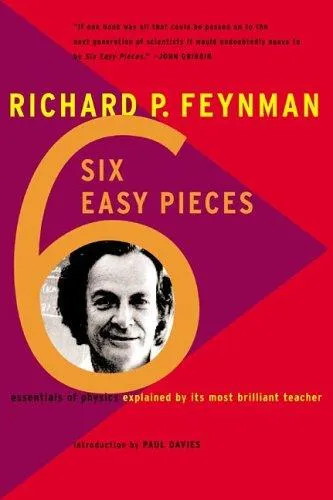14
mentions
mentions

Start with The Beginning of Infinity. Then read Matt Ridley, Nick Szabo, David Deutsch, Nassim Taleb, Schopenhauer, Peter Thiel, Popper, Feynman, Art DeVany, Scott Adams, Jed McKenna. Recognize them when they challenge socially enforced mass-delusions with science and logic.
— Naval Ravikant
2020-05-02 on twitter.com
https://twitter.com/naval/status/1256399553072267266
The books that I can read quickly, I don’t recommend. The books I recommend are ones that I savor, so the list doesn’t change much. Read and re-read everything by Deutsch, Taleb, Feynman, and Ridley. Come back when you’re done 😉.
— Naval Ravikant
2020-03-07 on twitter.com
https://twitter.com/naval/status/1236166078109114368
David Deutsch, “The Beginning of Infinity.” Matt Ridley, “The Rational Optimist.” Nassim Taleb, “Skin in the Game.” Richard Feynman, “Six Easy Pieces.”
— Naval Ravikant
2020-03-07 on twitter.com
https://twitter.com/naval/status/1236172401940942854
There are also many notable exceptions - Feynman, Deutsch, many who worked on the Manhattan Project. There’s no trend that more science makes them more left. In fact, it’s the opposite. Faculties move from left to right as you move from social sciences to natural sciences.
— Naval Ravikant
2020-02-27 on twitter.com
https://twitter.com/naval/status/1232983758749306880
Deutsch, Taleb, and Feynman mainly. Also Bohr, Schrödinger, Mandelbrot, Chait, Gödel, Rovelli, others (I know, some are mathematicians and some have never written a formal book on philosophy). On the non-physicist Western side, currently reading Schopenhauer.
— Naval Ravikant
2020-02-16 on twitter.com
https://twitter.com/naval/status/1228911036402524160
For example, instead of reading a business book, pick up Adam Smith’s The Wealth of Nations. Instead of reading a book on biology or evolution that’s written today, I would pick up Darwin’s Origin of the Species. Instead of reading a book on biotech right now that may be very advanced, I would just pick up The Eighth Day of Creation by Watson and Crick. Instead of reading advanced books on what cosmology and what Neil Degrasse Tyson and Stephen Hawking have been saying, you can pick up Richard Feynman’s Six Easy Pieces and start with basic physics.
— Naval Ravikant
2019-12-25 on nav.al
Matt Ridley, Neal Stephenson, Taleb, Borges, Ted Chiang, Anthony DeMello, Osho, J Krishnamurti, Harari, Asimov, Bradbury, Greg Egan, Feynman, Schrödinger, Bohr, Chris Alexander, the Durants, Darwin, Adam Smith, David Deutsch, Karl Popper, Douglas Hofstader, Douglas Adams
— Naval Ravikant
2019-03-17 on twitter.com
https://twitter.com/naval/status/1107132118776209409
(Fool anyone line is originally from Feynman BTW, recommend reading him directly).
— Naval Ravikant
2018-11-29 on twitter.com
https://twitter.com/naval/status/1068219516251865089
Favorite Feynman book? I think, like, everybody... Surely You’re Joking, Mr. Feynman is what sucks you in. They’re all good. I like Six Easy Pieces.
— Naval Ravikant
2018-01-20 on pscp.tv
It’s inside Richard Feynman’s “Six Easy Pieces.”
— Naval Ravikant
2018-01-01 on twitter.com
https://twitter.com/naval/status/947822051061927936
I would probably also give my kids a copy of Richard Feynman's Six Easy Pieces and Six Not-So Easy Pieces. Richard Feynman is a famous physicist. I love both his demeanor as well as his understanding of physics. I'd also give them a copy of Jiddu Krishnamurti's The Book of Life. But I'll tell them to save it until they're older because it won't make much sense while you're younger. But whatever you tell your kids, they're probably going to do the opposite.
— Naval Ravikant
2017-01-28 on killingbuddha.co
To answer your question - shortcut to Munger, M Ridley, Harari, Feynman, Darwin, J Krishnamurti. It'll be different next year ;-)
— Naval Ravikant
2017-01-27 on twitter.com
https://twitter.com/naval/status/824878559697129472
Feynman, Darwin, J Krishnamurti, Hitchens, Ridley, Harari, Aurelius, Seneca, Lao Tzu, Newton, Munger, Borges, D. Adams, Hesse...
— Naval Ravikant
2016-11-13 on twitter.com
https://twitter.com/naval/status/797908353586372608
I have a couple of core foundational values, and they’re not things that I explicitly developed. They’re just sort of you can look back after the fact and say oh yeah, I won’t compromise on those things. But now I realize how important honesty is. I learned that from a couple of different places. One is when I grew up, I wanted to be a physicist and I idolized Richard Feynman and I read everything by him, technical and nontechnical that I could get my hands on. He said: you must never, ever fool yourself and you are the easiest person to fool. So the physics grounding is very important because in physics, you have to speak truth. You don’t compromise. You don’t negotiate with people. You don’t try and make them feel better because if your equation is wrong, it just won’t work, whatever you’re doing. So I think the science background is important in that.
— Naval Ravikant
2015-08-08 on tim.blog